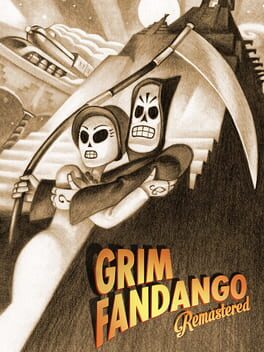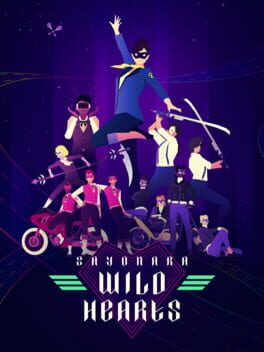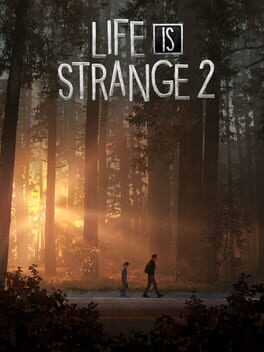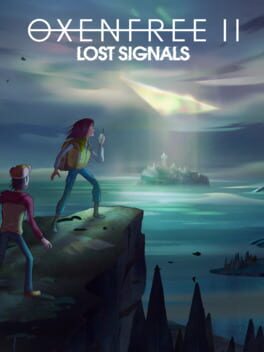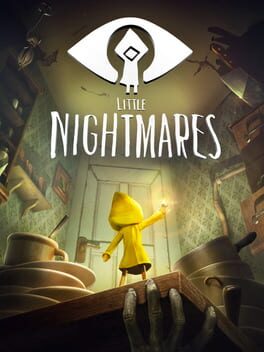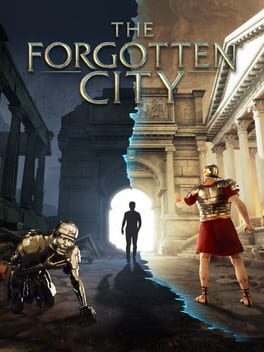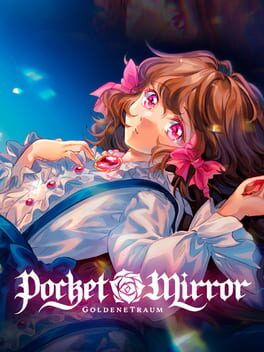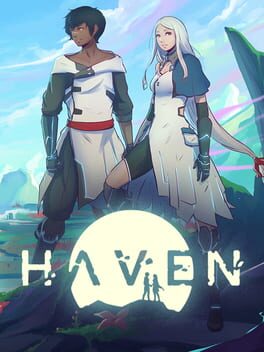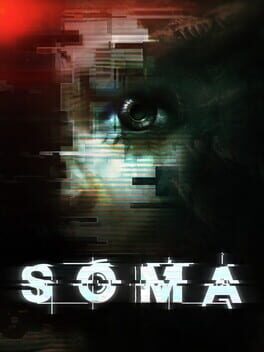adjansen
I see why people like this but it is more of a logic puzzle than a mystery—it's like a scenario in one of those Usborne Puzzle Adventure books for kids. After the first big ooh-ahh reveal there is nothing especially gripping or surprising on the narrative level, it's just the chore of sorting out tedious minutiae like who fell off the mizzenmast, who got popped with the blunderbuss, who fell starboard into the drink, and I finished more out of obligation than curiosity. Nice aesthetic tho.
Replaying this years later, the characters and story were even better than I remembered, while the puzzles were even WORSE :( A flawed gem with some of the best written (and best voiced!) characters in video game history stuck doing some of the most godforsaken nonsensical tasks. (Seriously tho the voice acting in AAA games these days cannot hold a candle to these fantastic performances, the actors completely bring these blocky characters to life.) As a fan of this game I implore you: just use a walkthrough and experience the story. Spare yourself the agony. But please do play the game because it's worth the hassle and the soundtrack is SO GOOD.
2019
2023
I am kind of a hater. My bitter soul shivers with icy excitement at the opportunity to nitpick that which is well-loved. BG3 offers a lot of nits to pick, especially if you are a story-motivated player. The overall story is, imo, surprisingly not good for a game that has received so much praise in that department. The strain of trying to weave together so many plot threads really shows. There are a lot of names thrown around that are probably supposed to be important, and goofy fantasy words that are probably supposed to mean something, and like twelve magical MacGuffins, and it all feels a bit like an AI was fed a long list of D&D tropes and tasked with fitting them in the same game. Also, whenever the story flirts with horror, it feels a bit like a bad FromSoft pastiche?
That said, there are quite a few scenes and character bits that work well in isolation. What probably happened is the developers were afraid of the game feeling too meandering and directionless, so they tried to superimpose a structure onto all these scattered backstory and sidequest ideas they had. Although I understand the impulse, the main plot is easily the dumbest and most boring part of the game, unfortunately. I think I would have preferred if the party was only traveling together because they all wanted to go to Baldur’s Gate for personal reasons–no big looming threat necessary.
Nevertheless, even my miserable shriveled little heart was warmed one or two paltry degrees by my time (roughly ten bazillion hours) with Baldur’s Gate 3. At the end of the day, it’s D&D in video game form with lots of fun and hot party members who want to bone you. It’s kind of a hard formula to mess up? Which is silly to say considering it’s also a very hard formula to, like, do, at all, given the bonkers amount of content, so I applaud them for trying. But what I mean is that the game is solid enough that bad writing is not a deal-breaker, and the moments when the writing does work are kind of nice little treats–a bit like eating Lucky Charms with not enough marshmallow pieces in it. Yes, of course, it would be nice if there were more marshmallows, but you’re still going to eat too many bowls like a big dork because hell yes the vampire twink is dtfff
That said, there are quite a few scenes and character bits that work well in isolation. What probably happened is the developers were afraid of the game feeling too meandering and directionless, so they tried to superimpose a structure onto all these scattered backstory and sidequest ideas they had. Although I understand the impulse, the main plot is easily the dumbest and most boring part of the game, unfortunately. I think I would have preferred if the party was only traveling together because they all wanted to go to Baldur’s Gate for personal reasons–no big looming threat necessary.
Nevertheless, even my miserable shriveled little heart was warmed one or two paltry degrees by my time (roughly ten bazillion hours) with Baldur’s Gate 3. At the end of the day, it’s D&D in video game form with lots of fun and hot party members who want to bone you. It’s kind of a hard formula to mess up? Which is silly to say considering it’s also a very hard formula to, like, do, at all, given the bonkers amount of content, so I applaud them for trying. But what I mean is that the game is solid enough that bad writing is not a deal-breaker, and the moments when the writing does work are kind of nice little treats–a bit like eating Lucky Charms with not enough marshmallow pieces in it. Yes, of course, it would be nice if there were more marshmallows, but you’re still going to eat too many bowls like a big dork because hell yes the vampire twink is dtfff
2022
2018
Life is Strange 2 is an odd one. On one hand, I admire the refusal to pander to fans of the first game, and willingness to try something new. Apart from a few easter eggs and cameos here and there, LiS2 truly could not care less about Max, Chloe, or Arcadia Bay, and I kind of like that energy. On the other hand, LiS2 doesn’t seem very aware of what made the first game compelling, and its attempt to tell a different kind of story ends up sabotaging a lot of what made the original work.
Life Is Strange was not by any metric a great work of art—it was a goofy, cringily written, emotionally manipulative teen melodrama—but it did have some effective hooks. There was a mystery to solve, a layered dynamic between the two leads, a quaint Twin Peaksy atmosphere with lots of archetypal characters, and there was the fun time-manipulation mechanic which let you see the immediate consequences of different narrative decisions before making up your mind.
Life Is Strange 2 lacks most of these, which would be okay, except it doesn’t do much to fill their absence. There’s little mystery this time beyond waiting to see if the brothers can make it to Mexico. The relationship between the brothers is sweet, but lacks the nuance of the Max/Chloe relationship, probably because one is still a kid, so the older one is pretty much just trying to be a good dad the whole time. The small-town vibes are jettisoned in favor of a road trip story with new locales in every chapter, which sounds fun in theory, but in practice ends up a slog, since every chapter opens with a bazillion descriptions to read and new characters to meet, who you already know will be gone soon, so there’s no real reason to care about them. Finally, the time-reversal mechanics are replaced with…the ability to tell your brother to fuck shit up with his brain, which is just not as interesting on a narrative level, since in every situation you basically have two options: tell your brother to fuck shit up, or tell him to not.
What LiS2 does retain from the original is its earnest sincerity and soap opera plot developments, two traits that serve the game less well than its predecessor. Life Is Strange was packed full of ludicrous teen drama, but it knew what kind of story it was telling, and never stepped too far outside the bounds of an edgy CW show. The themes of LiS2 are more overtly political, and as a result the game feels like a weird time capsule preserving a particular flavor of post-Obama mopey liberalism. The main messages seem to be: racism bad, border wall bad, america.....good? But the only way the writers know how to convey these simple ideas is by subjecting the protagonists to an unending parade of harassment and abuse. To be clear, there is nothing wrong with making a game with an anti-racist message, or with portraying racial violence, but the game simply ends up making the same points over and over, without deepening its themes or analysis. It feels awkward in the way that white liberals patting themselves on the back for recognizing racism often does.
I didn’t hate Life Is Strange 2. There are some touching moments along the way. But I really wish I could say its boldness pays off, when sadly the opposite is more often true. Also the soundtrack could have used a whole lot more Sufjan Stevens
Life Is Strange was not by any metric a great work of art—it was a goofy, cringily written, emotionally manipulative teen melodrama—but it did have some effective hooks. There was a mystery to solve, a layered dynamic between the two leads, a quaint Twin Peaksy atmosphere with lots of archetypal characters, and there was the fun time-manipulation mechanic which let you see the immediate consequences of different narrative decisions before making up your mind.
Life Is Strange 2 lacks most of these, which would be okay, except it doesn’t do much to fill their absence. There’s little mystery this time beyond waiting to see if the brothers can make it to Mexico. The relationship between the brothers is sweet, but lacks the nuance of the Max/Chloe relationship, probably because one is still a kid, so the older one is pretty much just trying to be a good dad the whole time. The small-town vibes are jettisoned in favor of a road trip story with new locales in every chapter, which sounds fun in theory, but in practice ends up a slog, since every chapter opens with a bazillion descriptions to read and new characters to meet, who you already know will be gone soon, so there’s no real reason to care about them. Finally, the time-reversal mechanics are replaced with…the ability to tell your brother to fuck shit up with his brain, which is just not as interesting on a narrative level, since in every situation you basically have two options: tell your brother to fuck shit up, or tell him to not.
What LiS2 does retain from the original is its earnest sincerity and soap opera plot developments, two traits that serve the game less well than its predecessor. Life Is Strange was packed full of ludicrous teen drama, but it knew what kind of story it was telling, and never stepped too far outside the bounds of an edgy CW show. The themes of LiS2 are more overtly political, and as a result the game feels like a weird time capsule preserving a particular flavor of post-Obama mopey liberalism. The main messages seem to be: racism bad, border wall bad, america.....good? But the only way the writers know how to convey these simple ideas is by subjecting the protagonists to an unending parade of harassment and abuse. To be clear, there is nothing wrong with making a game with an anti-racist message, or with portraying racial violence, but the game simply ends up making the same points over and over, without deepening its themes or analysis. It feels awkward in the way that white liberals patting themselves on the back for recognizing racism often does.
I didn’t hate Life Is Strange 2. There are some touching moments along the way. But I really wish I could say its boldness pays off, when sadly the opposite is more often true. Also the soundtrack could have used a whole lot more Sufjan Stevens
2022
Pentiment is enshrined in my pantheon of great narrative games alongside such modern classics as Kentucky Route Zero, Night in the Woods, and Disco Elysium. It demands more from the player than most games do, asking you to adjust to the rhythms and customs of country life in medieval Bavaria, and then to care about a very large and tangled web of relationships, with dozens of named characters who all know and gossip about each other, and also age and marry and have children and get sick and die. It took a while to grow on me, but I’ve rarely felt more rewarded for my investment. Highly recommended to anyone with the patience for it.
Huh. I wish I got more out of this game. It isn’t bad by any stretch; the atmosphere, which was a strength of the original Oxenfree, is even better here, with lovely sound design and pretty artwork, and nothing in the story jumped out at me as especially objectionable, although ymmv on that front. It all just feels very...slight? It’s a short game, there aren’t many characters, the gameplay is exactly what you would expect, and the story holds only a few mild revelations (even fewer if you’ve played the first game). Everything feels made on a miniature scale. Maybe I shouldn’t have played this in such close proximity to Pentiment, which has the density of a good novel, and allowed me to invest in the characters on a deeper level. Oxenfree II feels closer in spirit to a Netflix special. It looks and sounds good, but there is never enough substance or risk-taking to really wow you. Oh well.
"michel ultimate wife guy" - a friend
The big flaw in Fata Morgana is that it is unfortunately waaaaay longer than it needs to be—you could probably trim ten hours and leave the story intact. The only other flaw is that the story, while mysterious at first, by the end leaves nothing to suggestion: everything is explained (both figuratively and at times literally) to death.
Those caveats aside, this is a real banger of a VN that made me cry :'( Without giving anything away, the story handles its subject matter with such empathy and sensitivity that it makes other stories with similar plots look shoddy af. I'm not super well-versed in VNs and their tropes, but I did play the first Danganronpa forever ago, and it almost feels at times like the FM creators are casting mocking "behold fools, now THIS is how it's done" glances over their shoulders at their pathetic sadsack colleagues in the VN industry—except they also seem way too nice and thoughtful to be doing that lol.
In short, a killer love story, a heck of a soundtrack, and a metric ton of mfin words lmaoooo
The big flaw in Fata Morgana is that it is unfortunately waaaaay longer than it needs to be—you could probably trim ten hours and leave the story intact. The only other flaw is that the story, while mysterious at first, by the end leaves nothing to suggestion: everything is explained (both figuratively and at times literally) to death.
Those caveats aside, this is a real banger of a VN that made me cry :'( Without giving anything away, the story handles its subject matter with such empathy and sensitivity that it makes other stories with similar plots look shoddy af. I'm not super well-versed in VNs and their tropes, but I did play the first Danganronpa forever ago, and it almost feels at times like the FM creators are casting mocking "behold fools, now THIS is how it's done" glances over their shoulders at their pathetic sadsack colleagues in the VN industry—except they also seem way too nice and thoughtful to be doing that lol.
In short, a killer love story, a heck of a soundtrack, and a metric ton of mfin words lmaoooo
2017
Idk if it's coherent enough to be called its own subgenre, but atmospheric-horror-platformer-inspired-by-Limbo was definitely a thing in the 2010s. Little Nightmares is luckily better than Limbo thanks to its richer setting and story, and art design that draws on the grotesque caricatures of stop-motion animation and the more surreal works of Miyazaki to create a world approximating what I imagine a horror movie made by Studio Ghibli would feel like. So all of that is pretty rad. The game itself is...eh. Like Limbo, this is pretty much a cinematic experience dressed up as an interactive one. I mean, it is what it is, and works well enough as a game, but I guess I feel like the best and most essential parts of Little Nightmares could be condensed into an hour-long animated film, and you would not necessarily lose a great deal in translation. Or, to put it another way, this is an ideal Let's Play game—watching someone else play it is pretty darn close to the experience of playing it yourself.
2021
The Forgotten City gets off to a slightly rocky start imo, with the explanation of the time-loop premise feeling like one of those ridiculous Danganronpa-esque scenarios where the characters painfully overexplain what are clearly just a bunch of gameplay contrivances that wouldn't need to be explained in excruciating detail if the game didn't go to such great lengths to draw attention to them, but once the story finds its footing and the mystery draws you in, everything clicks. I have no real complaints except that I was more impressed by the clever construction of the plot than I was attached to the characters, so the attempts to tug on the heartstrings in the true ending left me a little cold. Still very much worth a play if you like narrative games with lots of conversation and some puzzle-solving.
2023
The strengths of Jusant are the climbing mechanics and the world itself, which tickles all the wonder sensors in the brain while feeling like a lived-in place. The game simply gives you a very cool structure to clamber around for a while and doesn’t try to do much more than that. Which was probably smart, because what little else there is to this game is noticeably less good. Pretty much every time the map opened up, I got stuck not knowing which way to go. As little exploration as there is, I kind of wish the whole thing had just been on rails to reduce this frustration, since it is ultimately a linear game.
Finally, the story is maybe a little too enigmatic for its own good. I understand that they were going for an open-ended minimalist mystical kind of vibe, in the vein of games like Journey, but idk how well that works with a premise and setting that feel more like hard science fiction. There are a few scattered clues here and there as to what is up with the planet and its ecosystem, but they are easy to miss and take a lot of work to piece together, which is a shame because they make the game way more interesting.
Finally, the story is maybe a little too enigmatic for its own good. I understand that they were going for an open-ended minimalist mystical kind of vibe, in the vein of games like Journey, but idk how well that works with a premise and setting that feel more like hard science fiction. There are a few scattered clues here and there as to what is up with the planet and its ecosystem, but they are easy to miss and take a lot of work to piece together, which is a shame because they make the game way more interesting.
Pocket Mirror is a bonkers gothic fever dream that isn’t well written and doesn’t make sense, but somehow that almost works in its favor? Let me be clear—the story is truly not good, and in a story-based game, that is usually a deal-breaker. But Pocket Mirror is not so much a story as a surrealist collage of tropes and aesthetics, and on this level, the everything-but-the-kitchen-sink approach pays off. You like jack-o-lanterns? Pocket Mirror’s got ’em. You like doppelgangers, creepy dolls, stuffed animals, eyes, roses, blood, blood on roses, blood on eyes, eyes on eyes, candles, tea parties, stained glass windows, crucifixion, churches, manors, theaters, circuses, unspeakable family secrets, and evil laughter? (Lots of evil laughter?)
Yep. Pocket Mirror’s got all that too. If this kind of stuff speaks to your subconscious, you will probably vibe with this game on some level, since it is mainly an excuse to serve up increasingly gorgeous set-pieces on increasingly lavish platters. And while the service may be amateurish, even hilariously bumbling at times, you can’t deny that the dishes were made with love. And jesus christ do they look good.
Yep. Pocket Mirror’s got all that too. If this kind of stuff speaks to your subconscious, you will probably vibe with this game on some level, since it is mainly an excuse to serve up increasingly gorgeous set-pieces on increasingly lavish platters. And while the service may be amateurish, even hilariously bumbling at times, you can’t deny that the dishes were made with love. And jesus christ do they look good.
2020
2015
The gameplay is kinda meh tbh but the story of Soma (SOMA? it looks wrong not in all-caps) worked for me in ways that these philosophical "what is hyoo-man" games rarely do. This is one of few games, maybe the only game now that I think of it, to have made me feel genuine existential terror, and I think that ought to count for something!

